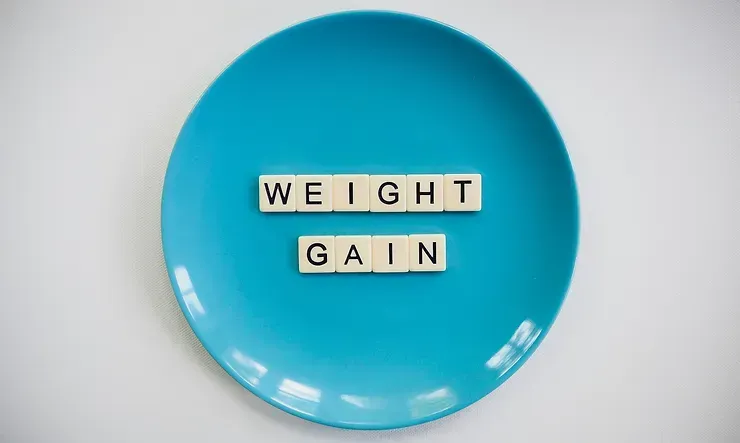
How to Prevent Weight Gain After Stopping the Keto Diet
How to Prevent Weight Gain After Stopping the Keto Diet
There are a number of different diets out there recommended by a sea of nutritionists, dieticians and health influencers – keto being one of the most popular in recent times. This diet can offer quick results, but many people don’t consider what happens when it comes to stopping keto. Whether you’ve been on the keto diet for a while and are ready to come off it, or are weighing up your long-term options – and asking the right questions about this diet – here’s what you need to know to prevent weight gain after stopping keto.
An overview of the keto diet
Before we explore how you can avoid weight gain after stopping keto, let’s review what this diet entails.

What is the keto diet?
Keto is actually short for the ketogenic diet – a type of diet that prioritizes fats over carbs. In short, it’s a high fat, low carb diet that’s been a popular way to lose weight in the health and fitness space for some time now.
There are different variations of the keto diet, but in general it involves making carbohydrates around 5% of your diet – with the rest being fats and protein. The split between fats and protein is where the variation occurs. This means that people on the keto diet avoid foods such as:
grains
rice
sugars
legumes
potatoes.
Avocados, fish and nuts are just a few of the foods you might associate with this diet thanks to their low-carb, high-fat content.
How does keto burn fat?
Drastically reducing your carbohydrate intake and replacing them with fats causes the body to enter the metabolic state of ketosis – where the body uses fat in order to generate energy rather than carbohydrates. But the main way this diet works for people to lose weight is calorie deficit. Eliminating a food group will in general reduce calories significantly and cause people to enter a significant caloric deficit.

Is keto healthy?
It’s thought that the keto diet can help with more than just weight loss. Those with health conditions ranging from diabetes to cancer may find that eating keto can help to alleviate the symptoms of their conditions.
And while it can be a healthy choice for some who are medically advised to adopt this diet, it isn’t always the case – especially in the long-term.
Like any other diet that drastically reduces the intake of a major food group, it’s difficult to recommend the keto diet on the basis of health – especially when you consider that scientific opinion is split on whether the keto diet is healthy or not. At the Macros Clinic, we believe that each food group plays a vital role in keeping our bodies fueled with the right nutrients and vitamins, so should be included in any healthy diet.

Side effects of keto
Following a keto diet can also cause a number of side effects – bad breath, digestive problems, and the ‘keto flu’ to name a few. But by far, the most worrying consequence of keto is the potential of developing nutrient deficiencies. Cutting out carbohydrates from your diet can result in your body lacking in important nutrients like iron, fiber, calcium, and vitamins A, C and D. So if you do choose to still go on this diet, it’s vital that you try to get all the necessary nutrients you would be getting from carbs in other forms.
What happens when you stop keto?
When you stop the keto diet, a number of things will happen to your body. The biggest change occurs in regards to the way your body creates energy – your metabolism. Keto works by triggering ketosis in the body, where fats are used to create energy rather than carbohydrates. But stopping keto means that your metabolism shifts too, returning to burning carbohydrates as the body’s main source of fuel. Here’s what else you might experience when you first stop the keto diet.
Your diet returns to "normal"
Stopping keto means you can finally start eating ‘normally’ again, which means your diet will change drastically. Many of the ‘keto-friendly’ recipes that feature carbohydrate substitutes can switch back to normal.
Bloating and digestive issues
As your body gets used to having more fiber, it can take a little time for your digestive system to adapt too. This could result in bloating and digestive issues.
You could put on weight
Because carbohydrates contain water, many people find that coming off keto means what feels like an inevitable period of weight gain as their ‘water weight’ returns. But this weight can just as easily be lost if you transition off of keto in the right way.
Why do people experience weight gain after keto?

Lack of discipline
The keto diet, like most diets out there, requires a lot of discipline in order to work. And like other restrictive diets, it can be hard to keep up with. Many people find that returning to normal eating habits means they find it difficult to resist their favorite foods that aren’t always healthy.
Drastic change to eating patterns
With your diet significantly increasing in carbohydrates and your metabolism switching back to primarily burning carbohydrates for fuel – rather than fats – your body might need a little time to re-adjust. Throughout this process, if you’re eating a significant amount of carbohydrates, you might put on weight.
Lack of clarity
When you come off the keto diet without any professional support, it’s difficult to keep track of how returning to a normal diet is affecting your body. This lack of clarity can lead to weight gain.
Reverse dieting: the key to preventing weight gain after stopping keto
If you’re wondering how to stop keto without gaining weight – reverse dieting is the answer. Coming off the keto diet isn’t as simple as it sounds, and needs to be done in a healthy, balanced way. In other words, you need to have a plan. The one we recommend most is reverse dieting. And one that will help you to avoid experiencing the issues we’ve just covered.
Reverse dieting provides guidance, support and clarity, making the transition back into a ‘normal’ diet a smoother one. It focuses on boosting the metabolism and encouraging your body to burn calories at its most efficient rate – and is particularly helpful for those coming off the keto diet as their bodies are still re-adjusting to the change in diet.

Keto vs reverse dieting
As we covered earlier, the keto diet has an effect on your body and weight because of the way it interacts with the metabolism. This might sound similar to the way that reverse dieting works, but there is a key difference that sets them apart. Ketogenic dieting triggers ketosis in the body – a completely different metabolic process than reverse dieting – and also less sustainable.Ketosis isn’t good for the body in the long-term, and logistically speaking, isn’t practical for life either. The restrictions of the keto diet can hold you back from getting the most out of life and cause long-term digestive problems. But reverse dieting gets you back in rhythm with your own body and supports a balanced, sustainable lifestyle.
How to stop keto without gaining weight: reverse dieting
If you’re ready to come off the keto diet but don’t want to sacrifice its results, reverse dieting is the best choice. Working with an experienced nutrition coach, you’ll be able to transition back to eating more carbohydrates without putting on weight – in fact, because reverse dieting works by boosting your body’s metabolism, you’ll find that you continue to lose weight, even after stopping keto. Get in touch with us today for an obligation-free 30 minute consultation to understand how the process works and whether it’s right for you.